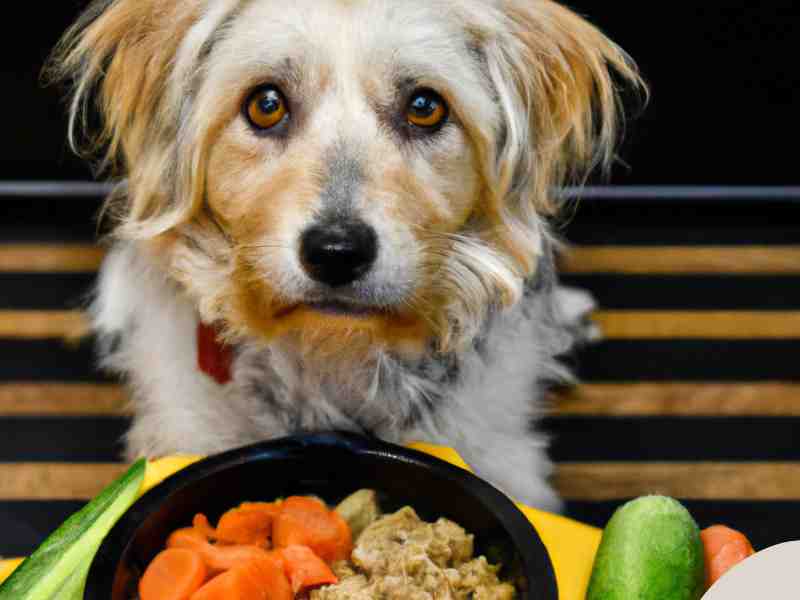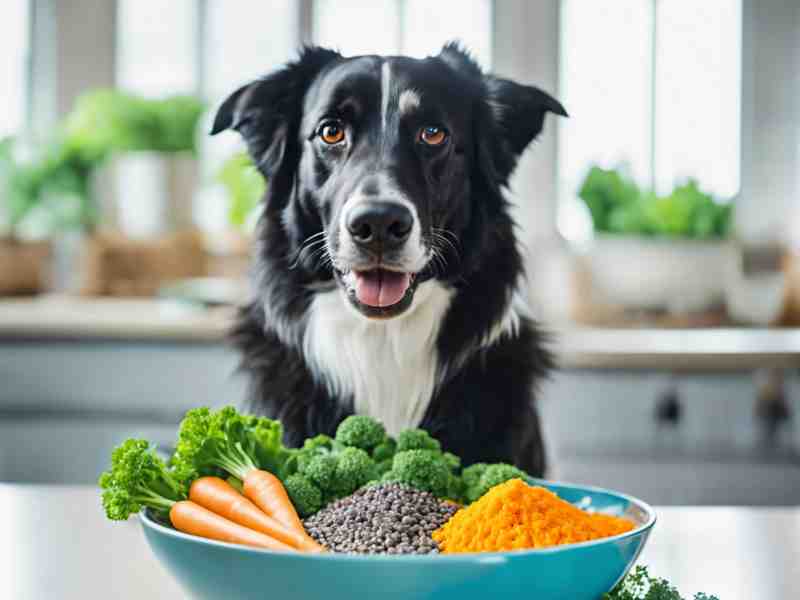Fermented foods aren’t just a health trend for humans; they’re also a fantastic addition to your dog’s diet. Packed with probiotic benefits, these superfoods can significantly enhance your furry friend’s health in numerous ways.
Benefits Of Fermented Foods For Pets
Fermented foods have been a staple in human diets for centuries, but did you know they can also be incredibly beneficial for your dog? These foods undergo a process called fermentation. This is where natural bacteria feed on the sugar and starch in the food and create lactic acid. This process preserves the food and creates beneficial enzymes, vitamins, and probiotics for guts.
Introducing fermented foods for dogs can lead to many health benefits that humans also enjoy when they have fermented foods. The probiotics produced during fermentation are the key players for dogs. They help maintain and restore the balance of good bacteria in their gut, which is crucial for optimal digestion and absorption of nutrients. A healthy gut microbiome also strengthens their immune system and can improve your dog’s overall health.
And the benefits don’t stop there. Fermentation also enhances the nutritional value of the food. It makes certain nutrients more available for absorption, increases vitamin levels, and can even break down potentially harmful food compounds. For instance, the fermentation of dairy products creates kefir. Doing so not only reduces the lactose content (which makes it easier for dogs to digest), but also enhances the levels of B vitamins and calcium available for your dog to absorb.
Science backs these benefits up. Studies show that probiotics can positively affect dogs’ gastrointestinal function and immune response. They also help improve dog digestion and nutrient absorption.
Incorporating fermented foods into your dog’s diet is a natural way to support their digestive health, enhance nutrient absorption, and boost their immune system. Whether it’s through fermented vegetables, kefir, or specially formulated dog foods, adding these nutrient-rich foods can make a significant difference in your pet’s health and vitality.
8 Benefits of Feeding Dogs Fermented Vegetables
- Enhanced Immune System Function: The gut is home to a significant portion of the body’s immune cells. By improving gut health with fermented vegetables, you also boost your dog’s immune system, making them better equipped to fight infections and diseases.
- Better Breath and Dental Health: Fermented vegetables can aid in reducing plaque buildup and promoting healthier gums and teeth, thanks to the natural enzymes they contain. Plus, a healthier gut can also lead to fresher breath.
- Increased Energy and Vitality: Dogs fed a diet rich in probiotics from fermented foods often exhibit higher energy levels and vitality. This is likely due to the improved nutrient absorption and overall gut health.
- Supports Healthy Skin and Coat: The nutrients and probiotics in fermented vegetables can contribute to healthier skin and a shinier coat. A balanced gut microbiome can help reduce skin irritations and promote a nice and lustrous coat by making sure nutrients are effectively absorbed.
- Improved Digestion and Nutrient Absorption: Fermented vegetables contain enzymes that help break down food, making it easier for dogs to digest. This improved digestion ensures that your dog can absorb more nutrients from their food, contributing to overall health and wellness.
- Help With Gastrointestinal Issues: Dogs suffering from conditions like diarrhea, constipation, or bloating can benefit from the probiotics in fermented vegetables. These probiotics help restore the balance of good gut bacteria, reducing or eliminating many common gastrointestinal issues.
- Support for Allergic Reactions and Sensitivities: The boost in immune function from eating fermented vegetables can help dogs with allergies. A stronger immune system is better equipped to handle allergens, potentially reducing the severity of allergic reactions.
- Detoxification and Waste Elimination: The beneficial bacteria in fermented vegetables can help detoxify your dog’s digestive system. This naturally promotes the elimination of toxins and waste, which helps maintain a healthy gut and supports overall organ health by reducing the burden on the liver and kidneys.
Learn More About DIY Fermenting Foods for Dogs
Crafting homemade fermented vegetables for your furry best friend is pretty easy to do if you’re interested. Many dog parents have come up with some great tips for fermenting foods for dogs at home.
- Select Dog-Friendly Vegetables: Start by choosing vegetables that are safe and beneficial for dogs. Popular options include carrots, cucumbers, green beans, and beets. These vegetables are nutritious and typically gentle on your dog’s digestive system.
- Prepare the Vegetables: Wash the vegetables thoroughly to remove any dirt or pesticides. Then, chop them into manageable, bite-sized pieces your dog can easily eat. This size also helps ensure that the vegetables ferment evenly and are easy for your dog to digest.
- Create the Brine Solution: In a clean mixing bowl, prepare a brine solution by dissolving a small amount of non-iodized salt (about 1-3 tablespoons, depending on the amount of vegetables and water) in filtered or distilled water. The salt concentration should be enough to encourage fermentation while being safe for your dog. A general guideline is to use approximately 2-3% salt by weight of the water.
- Jar Assembly: Place the chopped vegetables into a sterilized glass jar. Be SURE to leave some space at the top. Pour the brine solution over the vegetables until they are completely covered and submerged. This is exceptionally important to prevent mold growth.
- Fermentation Process: Cover the jar with a clean cloth or a loose lid to allow gasses to escape but also keep contaminants out. Store the jar at room temperature, away from direct sunlight, for anywhere from 2-7 days. The exact time you’ll need will depend on the room temperature and how tangy you want the vegetables to be. Warmer temperatures make fermentation happen quicker, so be sure to keep an eye on the progress.
- Taste Test and Storage: After a couple of days, start tasting the vegetables to determine if they’ve reached the desired level of fermentation. They’ll be tangy and if you’ve ever had fermented foods, you’ll know what’s right. When you get there, seal the jar tightly and transfer it to the refrigerator. The cooler temperature of the refrigerator is what slows down any additional fermentation process. You want to do this so you can preserve the vegetables’ taste and probiotic content.
- Serving to Your Dog: When you first introduce fermented foods to your dog, do so slowly. Start with small amounts to make sure they adjust well. Mix a tablespoon of the fermented veggies with their regular food and watch for how they react.
Not All Fermented Foods Are Probiotic
Understanding the difference between fermented foods and their probiotic content is important for maximizing the health benefits for your dog. You need to know that not all fermented foods have the probiotic power that others do, nor do all keep those beneficial bacteria long enough to make it to your dog’s bowl.
The fermentation process naturally generates probiotics through the activity of beneficial bacteria, yeasts, or fungi, which can offer numerous health benefits. However, live probiotics in fermented foods are not guaranteed when you do it yourself. The key factor influencing this is the treatment of the food after it’s been fermented, especially when talking about pasteurization. Many pet parents pasteurize fermented foods for dogs to extend the shelf life as a topper, but if you’re doing so, you have to be careful you keep the benefit.
Pasteurization involves heating the food to a temperature that kills most harmful and beneficial bacteria. So, if you pasteurize the fermented foods you make (or buy them pasteurized), they may still offer some health benefits but may not have live probiotics that fermented foods offer.
And, when it comes to probiotics from fermented foods, the effectiveness of probiotics is really dependent upon their survival through the harsh, acidic environment of your dog’s stomach. They need to reach the intestines so they can really bring benefits. Some commercial fermented products might not have strains of bacteria that are strong enough to survive the digestive journey, and you’re wasting money on fermented foods.
If you want to give your dog fermented foods with probiotic benefits, look for products labeled as “live” or “active” cultures. Or, if you’re making fermented foods at home, avoid heat-treating at the end of the process and store it in conditions that preserve the bacteria’s viability, like in the refrigerator.
Bernie’s Perfect Poop: Good Dog Gut Health With Every Bite
The science is there–fermented foods offer benefits to humans and dogs alike. And because we care about our dogs’ well-being, especially regarding their diet and digestion, we are all about looking into what may help strengthen their microbiome.
But we also know that life can be hectic and that best intentions don’t always fit into daily routines. That was the case for our family. We knew we wanted to strengthen our dog Bernie’s gut, but it was just not as easy or cost- effective as we wished it was until we created Bernie’s Perfect Poop. We put the gut health benefits similar to fermented foods into delicious grass flakes that our dogs couldn’t get enough of. We chose probiotic strains specifically because they were spore-hardy and could get through the harsh environment of our dogs’ stomachs, and made it as easy as sprinkling some over every meal. The additional premium fiber, prebiotics, and digestive enzymes all help make sure our dogs absorb all the nutrients from their food that they should.
Simple, dependable, and the delicious choice for your dog’s best gut health. After all, healthy dogs have happy lives!


